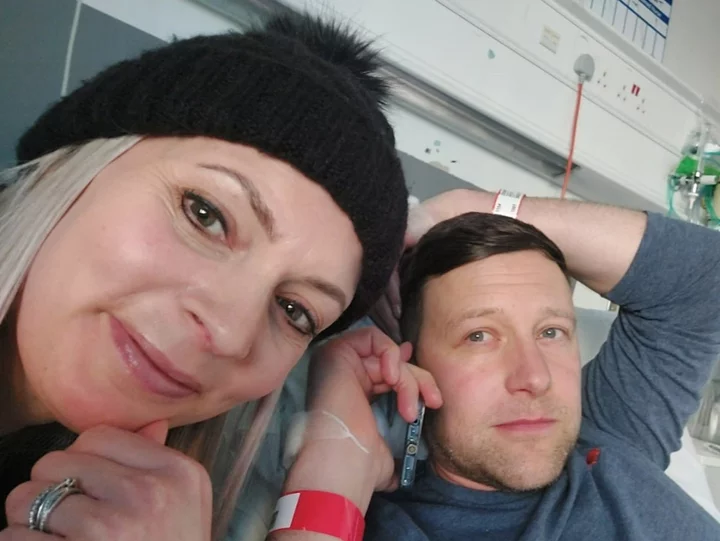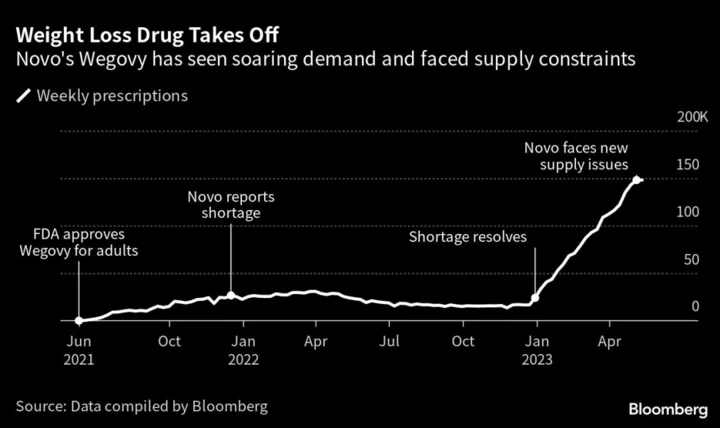
Jon Hamm Reacts to Joe Mazzulla's Obsession With 'The Town'
Jon Hamm on Joe Mazzulla's love for 'The Town'
1970-01-01 08:00

Capitol riot victims recount their experiences ahead of Oath Keepers seditious conspiracy sentencing
Multiple law enforcement officers and two US Capitol staff members stood before a federal judge in Washington, DC, on Wednesday and recounted their terror as a mob breached the US Capitol on January 6, 2021, as several Oath Keepers members are set to be sentenced for seditious conspiracy.
1970-01-01 08:00

Man’s ‘long Covid’ turns out to be decade-old brain tumour
A man who put his tiredness down to long Covid was told he actually had a brain tumour that had been growing for 10 years. Grant Churnin-Ritchie, 42, repeatedly visited his GP after a bout of Covid in July 2021 left him with constant tiredness and a tingling in his right arm. For several months, he was told it was long Covid, but Grant was convinced it was more serious. After blood tests, an ECG and an MRI scan, it was revealed he had a pituitary tumour. This type of tumour affects the pituitary gland, a pea-sized organ in the brain which controls growth and development. Grant, a Microsoft specialist from Horsforth, Leeds, West Yorkshire, said: “I kept going to my GP who said I had long Covid. This went on for several months, but I really didn’t feel well in myself and felt it was something more serious. “I was so tired and I was experiencing a tingling sensation in my arms. “I had blood tests and an ECG at Seacroft Hospital in Leeds, which revealed an abnormal heartbeat.” Grant was also told he had adrenal insufficiency - in which the adrenal gland doesn’t make enough hormones - and hypothyroidism - an under-active thyroid gland. These are both symptoms of a pituitary tumour. The father-of-three said: “An endocrinologist at St James’ University Hospital said it could be caused by Covid or a pituitary tumour. “An MRI scan confirmed it was a brain tumour which had probably been growing for 10 years.” Grant waited 11 months for his operation before the tumour was removed on January 16 2023. He said: “Soon after, I started to feel a lot better. Removing the tumour allowed some of the adrenal gland to start functioning again. “Even though I now have to take medication, I can lead a normal life. “Even though surgeons removed the tumour, there is a 20 per cent chance of it growing back. “I have an MRI scan in July so I should know more then.” Grant raised £2.5k after running Leeds Half Marathon for Brain Tumour Research on May 14 with his wife, Hannah, 40. He said: “Being able to run the half marathon with my wife Hannah was great, and I’m glad to be able to raise awareness of brain tumours. “Because I only had two months to train for the race, I found it very hard to complete. Luckily, I had my wonderful family and friends cheering me on which got me through it. “I wanted to give something back, and this was my way of saying thank you to the medical teams and Brain Tumour Research for what they do for people with this disease.” Matthew Price, community development manager at Brain Tumour Research said: “We’re really grateful to Grant for taking on the Leeds Half Marathon as it’s only with the support of people like him that we’re able to progress our research into brain tumours and improve the outcome for patients like him who are forced to fight this awful disease.” SWNS Read More Boy, 8, rushed to hospital after feeling constipated diagnosed with cancer A TikTok model made viral videos of her grandmother’s choice to die. Here’s why Parents of baby who died in maternity scandal say care concerns ‘batted away’ A 1D fan claimed she had a tumour. We still don’t know the truth after her death Talented boxer reveals first sign of brain tumour after collapsing at service station Father shares cancer symptoms he thought was too much coffee
1970-01-01 08:00

How to sleep in the heat, as summer weather finally arrives
Summer heatwaves are on the way, with temperatures predicted to jump into the mid-twenties this weekend and beyond. As lovely as this sounds though, as many of us have experienced year after year, sleeping in the heat can be challenging. So, why is sleeping harder when it’s hot? “Our bodies need to cool down in order to sleep” explains Theresa Schnorbach, psychologist and Emma sleep scientist. “As everyone’s bodies are acclimatised to different environments, there’s no hard and fast rule as to what temperature your bedroom should be, but it is recommended that your sleep environment be comfortably cool – usually this means between 15.5-19°C. If we are too warm, our core temperature is unable to drop, making it more difficult to fall asleep and causing sleep disturbances,” Schnorbach adds. So, how can you boost your sleep quality during summer heatwaves? 1. Ventilate wisely “Firstly, you should look to keep windows and curtains closed during the day to help keep your bedroom cool,” suggests Schnorbach. “During the night, you can open your windows and curtains to allow a fresh breeze in. A fan can also help to keep cool air circulating throughout the night, and the white noise produced by this can also have the added benefit of helping you to drift off.” Of course, only leave windows open if it’s safe and secure to do so. If that’s not an option, vents and fans may be your best friend for summer slumber! 2. Change your bedding if necessary “It’s also worth thinking about your mattress and bedding materials in warmer weather. Mattresses with open coil systems, for example, can allow air to circulate throughout,” says Schnorbach. “If you’re not looking to replace your whole mattress, a mattress topper can be a great alternative. When made from the right material, mattress toppers can keep you fresh and cool throughout the night by providing another breathable layer on top of your mattress, helping to regulate your body’s temperature and give you a comfortable sleep.” 3. Consider your pulse points It can be extremely frustrating when you’re tossing and turning due to over-heating. There may be additional steps you can take to boost that cool-down effect. “Utilise your body’s pulse points – areas where your blood flows closest to the surface of your skin, such as your wrists or the sides of your neck. Wrap an ice pack in a cloth or a towel – never apply ice directly to your skin – hold it against these pulse points to help you quickly cool off,” Schnorbach suggests. “Similarly, you can also use a hot-water bottle filled with cold water, a cool, damp flannel, or try splashing cold water on these pulse points. Your body’s blood vessels will react to the cool sensation and instantly bring your core temperature down. However, avoid your feet and hands, as this can prevent you from falling asleep.” 4. Take a lukewarm shower “While a freezing cold shower before bed may be what you’re craving to help beat the heat, I suggest opting for one that is lukewarm instead,” adds Schnorbach. “A shower that is too cold will actually cause the body to warm up again to re-balance the body temperature.” 5. Go nude or wear cotton “If you’re someone that can’t sleep without some kind of clothing on, wearing pyjamas of natural cotton is your best bet, as the material actually helps your skin breathe while absorbing your sweat during the night,” Schnorbach explains. 6. Munch on sleep-supporting fruits “A summer fruit that’s usually plentiful in the warmer months, cherries help to increase melatonin – a hormone that helps in promoting sleep. By producing more melatonin, your body can help better regulate its internal clock and you can doze off more easily at night,” Schnorbach explains. “Bananas are another fruit that can also help aid sleep. Bananas have high levels of magnesium and potassium, which can help to increase your sleep duration and promote relaxation.” 7. Have a cuddle And Schnorbach’s final tip? Have a snuggle. She says: “While it may feel counterintuitive, a cuddle before bed can help in reducing your core temperature by encouraging your blood vessels to dilate, thus losing excessive body heat.”
1970-01-01 08:00

DeSantis Joins Growing Republican Field: Breaking Down the Other Contenders
The number of candidates in the Republican presidential primary continues to grow. Florida Governor Ron DeSantis officially joined
1970-01-01 08:00

Yellowstone kills baby bison after park guest 'disturbs' the animal
Yellowstone says the bison calf was rejected by its herd after it was "disturbed" by a park guest.
1970-01-01 08:00

A Weight Loss Startup Touting Mindfulness, Noom Is Now Prescribing Drugs
Noom Inc., a startup that for years has touted a psychological path to weight loss, is now ready
1970-01-01 08:00

Derek Jeter and Alex Rodriguez Sitting Courtside is a Disaster for the Miami Heat
Not great vibes for Miami.
1970-01-01 08:00

Roundup: Dua Lipa Teases 'Barbie' Theme Song; The Celtics Stay Alive in Game 4; Aaron Rodgers Injures Calf
Dua Lipa teased her new song, the Celtics beat the Heat to stay alive, Aaron Rodgers tweaked his calf and more in the Roundup.
1970-01-01 08:00

Menopause stigma still ‘rife’ in workplaces as women fear for their careers
Nearly half (44%) of women experiencing menopause symptoms ‘suffer in silence’ at work, due to fears it could negatively impact their career. In a bid to hide symptoms, 48% say they would lie about why they needed a sick day, rather than saying menopause was affecting them, and 39% are still embarrassed to talk about the topic at work, according to a new survey by Lime Solicitors. The law firm polled 1,001 women who are experiencing or have experienced menopause or perimenopause. The research, carried out in April, also found 60% of respondents think their workplace should offer more menopause support, and less than a third (29%) of the women surveyed said they would feel comfortable asking for adjustments to help support them with menopause symptoms. “Our research shows that almost half the of women surveyed think going through menopause will negatively impact their career, which is why so many women suffer in silence,” said Neha Thethi, head of employment at Lime Solicitors. “It appears employers are failing an important part of their workforce by not providing the necessary support or creating a positive culture whereby people can raise concerns or issues with confidence. “To help dispel the stigma around menopause and empower women to speak freely and honestly about their experiences, we need menopause champions in all workplaces,” Neha added. How can employers help? “Menopause is a simple fact of life, and very much a reality in the workplace,” Paula Allen, global leader of research and total wellbeing, and senior vice-president at TELUS Health, told PA Media. While there has been a big increase in menopause awareness in recent years – with a number of celebrities, such as Davina McCall, shining a light on the topic, there’s still progress to be made. “It isn’t paid much attention in the workplace as a health issue, and therefore is rarely managed in a way that is optimum,” she added. She said, “eradicating stigma and inaction starts with education” – which can include “wellbeing sessions on all aspects of women’s health, including menopause, and training of managers on how to support employees with health needs”. Dee Murray, CEO of Menopause Experts Group, agrees awareness training is a key part of the picture. “Women who experience menopausal symptoms in the workplace are likely to need some support, or at the very least signposting, when they most need help,” said Murray. “Making sure line managers are trained, or at least have some basic knowledge, is hugely important. It’s also important to remember that those managers too may be experiencing menopause symptoms, or will do at some stage, if they are female. “Menopause champions – just like mental health first aiders – have become a vital part of the workplace for many women,” Murray adds. “Champions allow women to feel safe speaking out about symptoms that may be causing them extra anxiety and challenges at work. “Far too many women still feel embarrassed about discussing symptoms, and they must feel secure in the knowledge that they will not become the butt of the office jokes or judged about their symptoms, which can often be debilitating and very personal.” Workplace adjustments Allen said: “The good news is that even though menopause is a noteworthy health issue, the support needed from a workplace point of view can be quite simple. For example, menopause can cause drastic changes in body temperature, which can be addressed with fans, or by offering desks with windows or air conditioning vents close by. “Symptoms of menopause may also include insomnia, irritability and depressive symptoms, all of which have a physical base but can impact behaviour and mental wellbeing. With this, employees should take advantage of the personal support offered by their workplace through their Employee Assistance Program (EAP) and their Telemedicine provider if available.” A flexible approach Murray notes that flexible working can be an effective adjustment too. “Employers who offer flexible working hours and remote working will benefit in the longer term. Firms with Menopause Approved status find they have better retention of staff and are more competitive when it comes to recruitment too,” she said. “Those experiencing menopause are not always seeking special treatment, just acknowledgement and support to help them through what can be a tricky time.” Read More Charity boss speaks out over ‘traumatic’ encounter with royal aide Ukraine war’s heaviest fight rages in east - follow live Signs and symptoms of breast cancer as Amy Dowden reveals diagnosis Helen Flanagan says she spent her 20s ‘pregnant and breastfeeding’ Baby food and drink guidelines needed over sugar concerns, say health campaigners
1970-01-01 08:00

Boston Celtics avoid sweep in Game 4 against Miami Heat, but still face unprecedented task with 3-1 series hole
NBA fans -- put the brooms back in the cupboard. Following the Los Angeles Lakers being swept out of the playoffs by the Denver Nuggets, the Boston Celtics were keen to avoid meeting the same fate as their long-time rivals.
1970-01-01 08:00

Signs and symptoms of breast cancer as Amy Dowden reveals diagnosis
Strictly Come Dancing professional dancer Amy Dowden has revealed she has been diagnosed with breast cancer. Caerphilly-born Dowden, who joined the BBC dance competition show in 2017, shared the news on Instagram, telling fans that she is “determined” to return to the dance floor as soon as she can. The 32-year-old wrote: “Hey all, I’ve got some news which isn’t easy to share. I’ve recently been diagnosed with breast cancer but I’m determined to get back on that dance floor before you know it.”Maldives Dowden went to the GP after realising the lump had grown after her holiday. Last week she was diagnosed with stage three breast cancer. She told Hello Magazine: “My doctor explained to me that there are three grades, and three is the most aggressive, but they feel like they’ve caught mine early and to not be too alarmed because grade three would be expected in somebody of my age. “You just don’t ever think it’s going to happen to you. I hadn’t thought it was possible to get breast cancer at my age. “My mum has had breast cancer, but she had it at a later age, in her 50s.” What are the signs to know? Many women know that a lump can be a possible symptom of breast cancer, but there are other signs of the disease to look for,” says Manveet Basra, head of public health and wellbeing at Breast Cancer Now. “While most breast changes, including lumps, won’t be cancer, it’s important to contact your GP as soon as possible if you notice a change to your breast that’s new or unusual for you, as the sooner breast cancer is found, the more successful treatment is likely to be.” Clare O’Neill from CoppaFeel!, wants everyone to be breast aware, “Because people of all ages and genders have breast tissue”, she says. She recommends checking your breasts or pecs once a month, while adding: “It can be normal to have pain and lumps around the time of your period.” So what symptoms other than lumps should you be aware of? If you see “any puckering, thickening, dimpling or rash of the skin, talk to your doctor”, advises O’Neill. “Also talk to your doctor if you notice a change in direction of the nipple or any bleeding or discharge from the nipple, or swelling of the chest or armpit. Breast awareness is not supposed to be scary, it’s about empowering people to know their bodies.” How to check your breasts “Checking your breasts only takes a few minutes. It could be when getting dressed, when showering or putting on moisturiser,” says Basra. “It’s important to remember to check your whole breast area, your armpits and up to your collarbone (upper chest) for changes. There’s no special technique, it’s as simple as TLC: Touch, Look, Check.” See your GP if you have any worries about possible symptoms, and you can call Breast Cancer Now’s free helpline on 0808 800 6000. Read More Charity boss speaks out over ‘traumatic’ encounter with royal aide Ukraine war’s heaviest fight rages in east - follow live Helen Flanagan says she spent her 20s ‘pregnant and breastfeeding’ Baby food and drink guidelines needed over sugar concerns, say health campaigners Period advice now being offered by Amazon’s Alexa
1970-01-01 08:00
